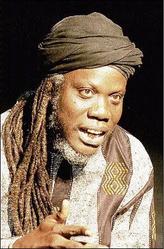Mel Cooke, Freelance Writer

Mutabaruka - file
Before poet Mutabaruka performed at Word Soun's, held at Liberty Hall, Kingston, on Sunday afternoon, curator Donna McFarlane noted that it was an event that had been on the cards for some time.
"He is what we call a very close family member of Liberty Hall. From the very beginning, at our opening, Muta has been a very strong supporter of Liberty Hall," she said.
And when he began an extended performance which was well worth the wait, in which incisive commentary was mixed with poetry, Mutabaruka noted how long it has taken for him to perform at Liberty Hall but "now is the time, so we are here".
Collection
With his double-book poetry collection in his hands, Mutabaruka said, "I want to share some of my poems and some of my thoughts surrounding writing these poems."
He explained that before he started recording he was a literary artiste and those poems were collected in Mutabaruka: The First Poems. Then he started putting poems on albums with music instead of in books, but eventually "we actually take the poems from the CDs and put them in book".
And with a deft flip of his hand he revealed the other title of the two-in-one book, Mutabaruka: The Next Poems.
"We are back to where we started as a literary artiste, rather than a reggae artiste," he said.
And that literary artistry was on full display for the audience at Liberty Hall's covered rooftop on Sunday afternoon, the sun gradually descending until it glowed through the space created by the raised shutters at the sides.
The new world
He started with Colombus' Ghost, noting that while 1492 is generally known as the year he stumbled upon what became known as the New World, it was also the year that the Spanish ran the black people out of Spain. Thievin Legacy demanded "gimme me dis, gimme me dat, gimme back me everyting yu got", Mutabaruka reading some poems and removing the microphone from the lectern to deliver others from memory, at points closing his eyes, which when open glinted with amusement, burned with anger or danced with the excitement of 'reasoning'.
A bird flew (not an eagle, naturally), flew through one side of the rooftop and out the other as he was doing Eyes of Liberty ("There is a statue in New York called the Statue of Liberty. America really love tek liberty wid people," he commented). He noted that "if you is a person who travel a lot you fin' dat de TV become yu bes' fren", before doing a poem which noted the incongruous happenings in America and concluding "so I sit here watchin' TV, askin' the question 'what is a Third World country?'"
Johnny Drughead led into an analysis of just what is a drug, Mutabaruka concluding "we fin' dat de drugs whe legal kill more people dan de drugs whe no legal".
"Dem waan go into a country wid de beer," Mutabaruka said, adding that the "gay guy" there said no, because they could not support a product which was supporting music, which included messages against homosexuality.
"Is because some queer guy in South Africa sey dem not going to come down dere wid dem product if dem sponsor some event in Jamaica," Mutabaruka attributed the withdrawal to. "We sey dem is very hypocritical," he said.
Criticism
The poetry and extended commentary in between rolled on, Junk Food also classified as a legal drug and 'Nursery Rhyme Lament' dismissing not only the nursery rhymes but also those who criticise deejays without hearing what they are saying. "Dese people don' distinctly hear nutten dat dem sey is foolishness," he said.
Mutabaruka addressed skin bleaching, the Haitian Revolution and the current state of the country and social distinctions in Jamaica before he got to the sad part, reading a poem for his dead colleague, Pele Lanier, as well as Lucky for Lucky Dube, the latter saying "the bullets echo, but the ballads echo more".
And he closed with the 'ticklish' part, an extensive critique of Biblical stories, including the ones of Noah and the Ark and the Immaculate Conception before closing with 'Dis Poem'. An on stage interview with Professor Carolyn Cooper followed.

